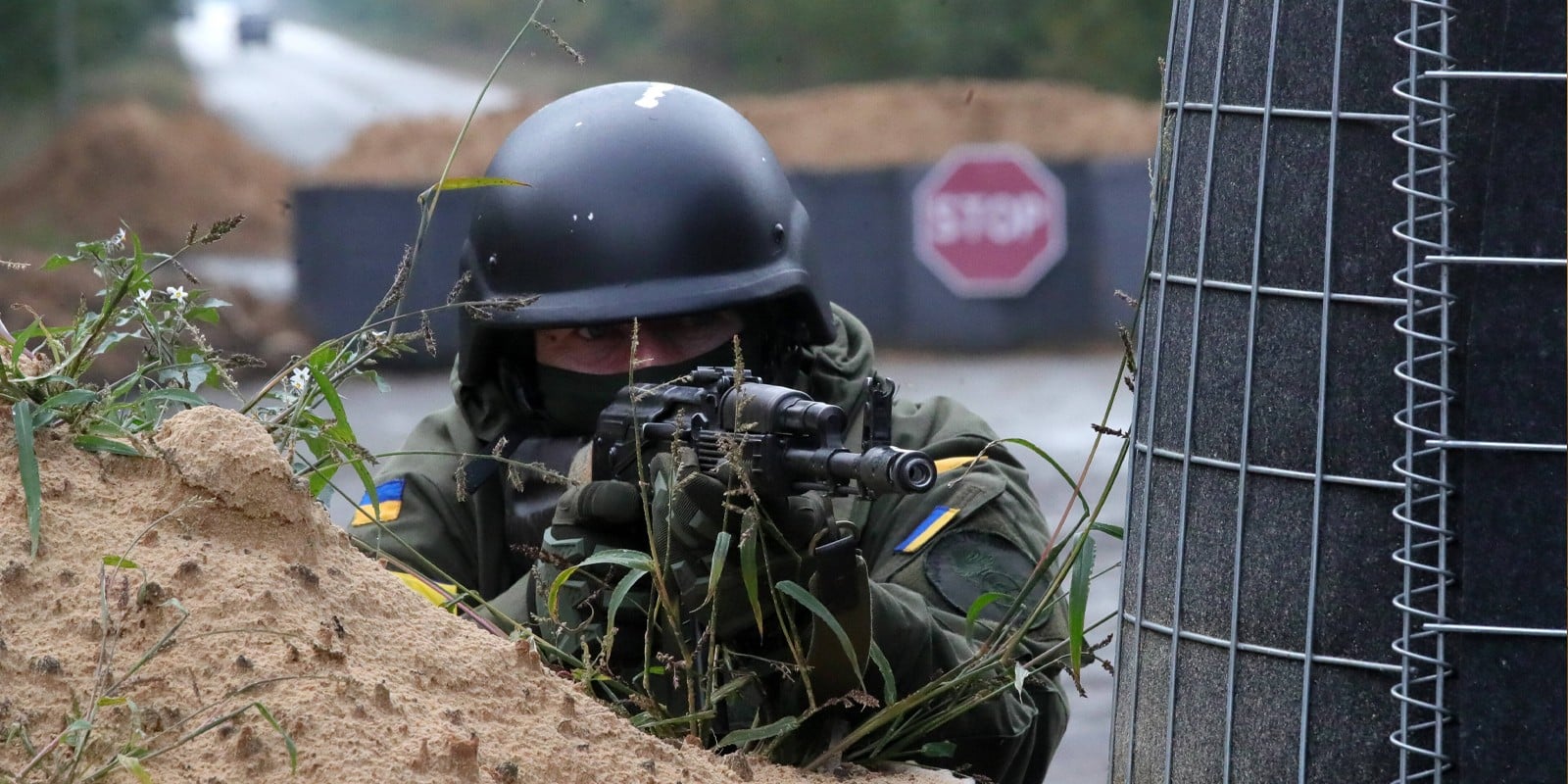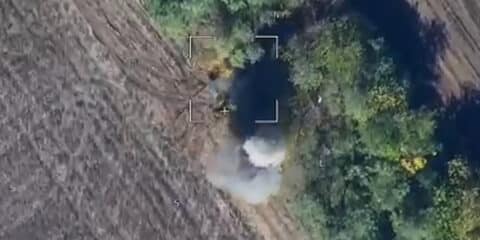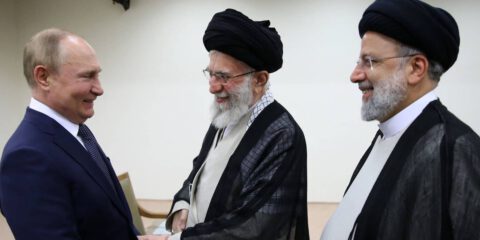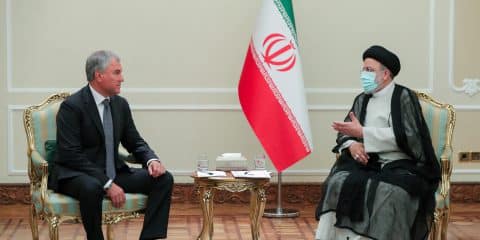The global and regional reality created by the war strengthens Israel and enhances its international and regional standing
The war in Ukraine is clearly far from over. For Israel, the changes it is bringing about – internationally and regionally – have far-reaching implications for some of the key components of our national security.
The West, writ large (and specifically Europe), woke up to the sudden reality of military threats, and the prospect of a major contract for the sale of Israeli missile defense technology to Germany is but one part of a broader pattern: enhancing Israel’s position as a significant center of military production and innovation. This is often accompanied by a growing understanding of Israel’s motivations and conduct in a dangerous strategic environment.
Meanwhile, Iran’s blatant support for Russia, and specifically the supply of drones used in attacks on civilian targets, make it easier for Israel to make the case against concessions that would fuel Tehran’s ambitions. Ukrainian advances on the battlefield validate the position of the community of Western-oriented democracies (and other allies) to which Israel belongs. Moreover, one important gain is the greatly increased rate of aliyah (the term used to connote the Jewish return to the Land of Israel) from both Ukraine and Russia, leaving its mark on Israeli demography.
The War in Ukraine as a Formative Historical Event
Eight months after it began, it is by now evident that the war in Ukraine is by far the most significant conflict in Europe since 1945, a formative milestone at the global level looking well into the future. It poses a long list of questions and challenges. Beyond the huge loss in human lives, both combatants and civilians, and the incomprehensible scope of material ruin (already assessed at hundreds of billions of dollars that will require immense reconstruction work, when that day comes), it has also put to the test some of the foundational aspects of the 21st-century global order:
- The Russian Paradox. An ever-widening and thus dangerous gap has been opening between Moscow’s pretensions to a unique role in world affairs, and its actual abilities as tested by the war. The Russian Federation is still a first-rate power in terms of geographical expanse, the size of its nuclear arsenal, and to some extent, still, a key player in the world’s energy markets. On the other hand, it turns out that its conventional armed forces and its capabilities in the fields of technology and intelligence are less impressive than commonly assumed, and certainly less effective than President Vladimir Putin expected when he launched his offensive. In purely economic terms, Russia is a third-rate power: Russian GDP, even before the cost of the war and the impact of the sanctions, was smaller than that of South Korea, and barely four times that of Israel. All this enhances the probability of continued warfare. It also makes it all the more important for Russia to latch on to the few strategic achievements it has been able to score in recent years, such as its success in helping the Assad regime survive. In Syria, it was able to take advantage of the West’s reluctance to intervene, and thus build up its prestige – in the region and beyond – as Assad’s savior. No such prospects loom on the horizon anywhere else, making the stakes in Syria even higher.
- The sharpening global bipolar rivalry. As US President Joe Biden’s National Security Strategy document published in October states all too clearly, global competition is shaping up between two camps. China and Russia – with Iran in tow – apparently pose a common challenge both to American strategic hegemony and to the values that underlie the Western alliance. They position themselves as opponents of the basic democratic principles that the Biden administration, unlike Trump’s, wishes to put up front. It is this common democratic identity, rather than a more concrete interest, which now serves as the main argument in favor of the broad scope of US and EU support for Ukraine and its leader, President Volodymyr Zelensky. Among other tools of the West’s opponents, the Shanghai Cooperation Organization – recently joined by Iran – emerges as an alternative forum, although it has also been joined by India and Central Asian countries that do not necessarily wish to do Putin’s bidding (or Xi’s). In any case, it should be noted that many countries in the Third World do not share the sense of outrage in the West over the invasion of Ukraine, and shy away from anti-Russian statements and UN votes.
- The reawakening of security and military concerns in the West. Not too long ago, an Israel scholar of world renown could claim in his book that the three age-old banes of human existence – famine, plagues and wars – are largely a thing of the past. Not so. It turned out, much to his public dismay, that a devastating war on European soil is all too real, no less than the pandemic of the past two years and the prospect of famine, which according to some dire predictions, including those of The Economist, is likely to soon engulf large areas of the world due to the collapse of the supply chain.
The implications of this insight are dramatic, even if it is not always easy to translate into political decisions on budgets and orders of battle. Significant indicators are the sentiments of the Socialist-Green-Liberal coalition in Germany (where military sentiments were looked down on for good reasons). Olaf Scholz and his cabinet are now leading a drive to increase the defense budget by almost $100 billion, a stark reversal from what would have been expected from this coalition. Should this happen, Germany (and other allies) would draw closer to the traditional NATO goal of 2% of GDP a year in defense spending.
Germany is not alone in reaching certain drastic conclusions. Sweden and Finland are joining NATO. Huge amounts of weapons and money pour into Ukraine. These are signs of a deep shift in perceptions – even if a direct insertion of forces for combat on Ukraine’s side is not in the cards. The latter hesitation is due to the Russian threat to use nuclear weapons against any country that would actively join the fray.
- Turmoil in the Energy markets. Until recently, there was optimism over the shifting from fossil fuels to renewable energies in the next few decades. The latter was expected to grow ever cheaper due to technological innovations. Now the war, the sanctions, the Russian overt and covert retaliation against the gas supply to Europe, and recently, the Russian decision to back away from the deal to allow grain exports from Ukrainian ports, later rescinded, all combine to generate real as well as contrived shortages; and it feeds the fears of a “cold winter” in Europe, and a global shortage that will generate inflationary pressures sending the price of other commodities soaring ever higher. While there are often deliberate exaggerations and tendentious statements backed by specific interests – after all, prices have already gone down while the war is still raging – it remains true that in the next few years, at least, there will be no other choice but to rely on natural gas and other fossil fuel, as well as on nuclear power plants.
The War’s Effect on Israel’s National Security
Each of the developments and issues presented above has a direct and possibly long-term effect on Israel and its international and regional standing. Israelis are sensitive to the tragic aspects of the crisis, and sentiments of support have been aroused by the Ukrainians’ resolute stance and by the unique figure of Zelensky (although some wonder if his confrontational approach, prior to the invasion, may have been misguided). At the same time, in almost all aspects, the war has enhanced Israel’s national security equation – and bolstered its position in world affairs.
Aliyah (Jewish immigration)
An element of immense importance, from a national and Zionist perspective, is the dramatic rise in the number of people making aliyah, in the face of danger and deprivation in both warring nations. Over 13,000 olim from Ukraine have arrived in Israel since February, and almost alone among the millions of war refugees, it has been the Jews (including those who may be non-Jews but are entitled to aliyah because they have one Jewish grandparent) who had a home to go to.
A steadily growing flow is coming from Russia, as socio-economic conditions keep deteriorating and the partial mobilization of reserves has been declared. This may be one of the reasons for actions taken against the Jewish Agency and the slurs aimed at Chabad. Israel’s Aliyah and Integration Ministry reported nearly 19,000 olim from Russia during the first five months of the war – a more than fourfold rise compared with the same period in 2021. To this should be added the contribution of refugees who are not eligible for aliyah but were taken in as a humanitarian gesture. Israel’s Zionist imperative, under such circumstances, is rooted in core values and identity, not in the calculus of interest. Still, past experience has taught that any demographic contribution to the Jewish collective in Israel is of strategic importance in the long run for the national economy.
The Diplomatic Dimension
The war did generate – albeit only in the first few weeks – a rare and indeed unprecedented opportunity for Israel’s then-prime minister Naftali Bennett to position himself as a mediator, or at least a go-between, a situation that grabbed the spotlight of global attention. To some extent, this was at the time a way out and a way forward of the dilemma posed by Israel’s need to keep open channels with both sides. The ongoing Israeli activity in Syria, as part of the so-called Campaign Between the Wars (MABAM, as it’s known by its Hebrew acronym) requires ongoing deconfliction contact with the Russian Air Force, while Israel was also willing to be of help to the Ukrainian leadership, which at the time sought dialog with Putin.
Israel’s motivations and considerations won a degree of understanding in both Washington and Moscow, although Zelensky, until recently, has been openly critical of Israel’s polite refusal to supply his country with lethal weapons. (Support was limited to defensive items, such as helmets, and humanitarian assistance, such as the deployment of an Israeli field hospital, and was recently extended to intelligence sharing due to Iran’s support for the Russian war effort).
The window of opportunity for mediation – and for a diplomatic positioning acceptable to both sides – has since closed, and not only due to the (real) difference in style and nuance between Bennett and his partner and successor, Yair Lapid, who seemed more attuned to Western sensibilities. Israel is not quite free to choose a course of action based on non-alignment, when the US and the West are fully committed to supporting Ukraine. Moreover, as detailed below, the ongoing polarization of the global order does bring with it significant benefits for Israel, as long as Jerusalem continues to be identified with the West.
Moreover, it is not only the personal channels of communication with Putin, and friendly diplomacy with Moscow that made it possible to reach a deconfliction mechanism with the Russian presence in the skies over Syria. Equally, or even more importantly, this was driven by the Russians’ long acquaintance with the capabilities of the Israeli Air Force, and their understanding of what an all-out confrontation would mean for the survival of Assad’s regime, in which they have invested so much.
As it happens, the arrangements, and the direct line between the IAF headquarters and the Russian base at Hmeimim, persisted even when diplomatic tensions grew worse, and Israel openly joined the international criticism of Russia’s action in Ukraine. Still, there is no reason to test the point at which Russia’s volatile patience will run out, and it is legitimate to remain cautious over weapons sales to Ukraine. There are limits to what Israel can part with amid regional tensions, and in any case, it is the US and its NATO allies that undertook to arm Ukraine since the war began, at a cost of tens of billions of dollars. Israel’s contribution is bound to be marginal.
Military Exports and Growing Security Cooperation
Meanwhile, the military-industrial complex – another important part of Israel’s strategic assets and resources – has also been dramatically affected by the war. It has grown in prominence globally, including economically, due to a transformed sense of threat in the West. Israel’s defense industries, which provide an indispensable contribution both to the IDF’s qualitative edge and to the national economy, have been on the unimaginable brink of really taking off ever since the war broke out.
During Prime Minister Lapid’s visit to Berlin, the option of a contract with Germany for the sale of Israel’s Arrow 3 missile defense system for more than $2 billion was put on the table. It is part of a broader pattern that is likely to bring Israel’s military exports – to leading countries, including the US, and no longer to suspect third-world regimes – above the $15 billion mark annually.
This significant economic boost is itself a source of national strength. The Israeli economy is rapidly growing in several sectors, is at full employment, and has a government surplus of tax income, all of which contribute to strategic resilience. Beyond that, military exports do carry with them some diplomatic weight. It is not always decisive: it took India, for example, many years to change the pattern of its anti-Israeli votes at the UN, even when security cooperation grew exponentially. Still, the approach by several European Union member states seeking Israel’s advanced technologies generates an opportunity to influence their overall attitude toward Israel, and blunt the edge of the pro-Palestinian fixation of EU foreign policy.
In a more general sense, there is another impact of the war in Ukraine – less concrete, yet important – on Israel’s standing in the world. Dramatic security events, such as 9/11, the later wave of terrorism in Europe, and now the war in Ukraine can help others understand both the challenges and dangers Israel faces, and the manner in which it responds to them. Negative terms such as “militarism” and “securitization” (the claim that nations such as Israel see all things through the lens of security and secrecy, and thus give cover to iniquities) are cast aside in favor of the defense and intelligence discourse, in which Israel carries weight well beyond its demographic and geographical dimensions.
The Demand for Energy
The sharp rise in the costs of oil and gas, and the fears of a cold winter in Europe, had an almost immediate effect on Israel’s position as an energy exporter (albeit a minor one). There was once again talk about the economic feasibility of the EastMed Pipeline, after the US essentially buried it. Other ways of exporting to Europe, based on existing arrangements – such as the tripartite EU-Egypt-Israeli agreement for the use of Egyptian liquification facilities – have gained importance. The talks leading to the agreement began before the war but were greatly accelerated by it.
The same is true for the internal Lebanese dynamic that led to the signing of the parallel exchange of letters over the maritime boundary delineation with Israel. The generous concession Israel made reflected the need to quickly bring gas to the markets, rather than a surrender to Hezbollah’s threats. Israel responded to US and French needs – and enabled Energean to stay in place and begin gas production at the Karish field. Indirectly, this also undermines Hezbollah’s raison d’etre: if Israel thinks and acts in the “win-win” toward Lebanon, what need is there for an armed Iranian proxy that pretends to be the “protector of Lebanon”? The willingness of President Michel Aoun, long an ally of Hezbollah, to sign the agreement was proof that the war has had an effect, through the gas market, on Israel’s strategic environment.
The War and the Iranian Nuclear Challenge
The implications of the war for Iran, and for the failed (so far) prospects of a renegotiated return to the JCPOA of 2015, have produced a complex balance. It is more than likely that the Iranian leadership looking at the lessons of the war can see the clear benefit of Russia possessing (and brandishing) a massive nuclear arsenal – being used, without hesitation, to deter the West from intervening directly. This stands in stark comparison with the price Ukraine is paying for its decision, in the Budapest Agreement of 1994, to forego the nuclear weapons based on its soil during the Soviet era in return for high-minded American verbiage. The implications for Iran seem all too obvious, and could be the basic reason for Iran’s maneuvers to keep open the option of obtaining nuclear arms within the next few years.
At first, it seemed as if the West (specifically France, but also the key players in the Biden administration) would acquiesce. It appeared to be driven by the energy crisis to take a much more accommodating position toward Iran, so as to bring Tehran’s oil back to the markets and help reduce prices at the pump. This may well be a very short-sighted calculation: after all, Iran, as a regional power bolstered by nuclear deterrence, can in the not too distant future destroy the global energy order and dictate terms and prices to its neighbors in the Gulf and the Caspian Sea. But when politically damaging protests against “five dollars a gallon” spread in the US, it had an effect on Biden’s priorities. Iran, for its part, identified this point of weakness and sought to leverage it at the negotiating table.
At that point, with the US team increasingly frustrated by Iran’s posture, another aspect of the war began to have an impact but in the opposite direction, namely, the growing affinity between the regime in Iran and Putin’s Russia (as well as Xi’s China), an affinity that seems to have led to a Western reassessment of the Iranian issue as a whole. On this point, Israeli messages, both in terms of intelligence information shared with Western partners and its public diplomacy decrying Iran’s policies, may have helped “move the needle.” So did the harrowing images of women’s repression and protest. It is already safe to say that the illusions that accompanied the 2015 deal, at least in the minds of some Obama officials – namely, that it would induce positive change in Iran – have almost entirely dissipated. The president is Ebrahim Raisi, the “butcher of Tehran,” not Hassan Rouhani, the perceived reformist. Attacks on the Gulf states demonstrate the regime’s mindset. Years of subversion and terrorism, even beyond the region, have left their mark on the attitudes in Washington, and specifically those of the defense establishment toward Iran, hence Biden’s decision not to delist the IRGC as a terrorist organization.
This was and is significantly exacerbated, in the context of a polarized world order, by Iran’s active support for Russia in the war: most significantly, the role played by Shahed-136 drones in the Russian attacks on Ukrainian cities and civilian infrastructure. Early on there were other voices heard in Tehran, given that Russia, pressed by sanctions, was edging the Iranians out of the Chinese energy market. Yet it was ultimately the call of the supreme leader, Ali Khamenei, whose ideological orientation and bitter hate of the US, the West, and their values led Iran not only to back Russia, but to sell it arms that can alter the balance in the battlefield. For Iran, this was an opportunity to display its technological prowess (although there were reports about the drones’ limitations) but also – mainly – to bind itself strategically to America’s enemies.
Israel did take steps – including President Isaac Herzog’s visit to Washington on October 26 – to persuade Biden, Scholz, Macron and the British leadership that this Iranian choice of sides is a watershed event. In Washington and in Europe, there may have been a tendency to marginalize the Iranian issue as an irritant to be resolved so as to focus on what is truly important: the Russian threat, and ultimately, the Chinese challenge. But with Iran firmly aligning itself – despite ideological differences, unresolved tensions and contending interests – with the anti-Western camp forged by the war, the meaning of a nuclear deal changes. It is no longer a statesmanlike achievement for US diplomacy, but a sign of fatal weakness in the face of a scheming, hostile player.
Given that the effort to reach an agreement will not be resumed until after the US congressional elections (November 8), this would imply that Iran’s current conduct will be part of the public and political debate in the US. Even without confronting the administration, Israel can and should sharpen the message. A bad nuclear deal with Iran is not a price that needs to be paid so as to clear the way for the main effort against Russia and China. It is a “roadside bomb” that can seriously harm, for years to come, the interests of the West and serve its rivals. An opportunity for Iran to dominate the key nodes in a region of supreme strategic importance, under the umbrella of a nuclear threat and amid extensive subversion fueled by energy exports, will also give Russia and China major leverage globally.
Managing the Risks
Inevitably, an Israeli position that is focused on the Iranian threat and the implications of Iran’s support for Russia (including some intelligence sharing with Kyiv) means further deterioration in the relationship with Putin, but in any case, this can hardly be avoided. In addition to the expectations of the Biden administration, the mainstream of both parties in Congress, and friendly European leaders, Israel should also be aware of attitudes among American Jews, who strongly support Ukraine now (despite the highly unsavory history of Ukrainian nationalism and its attitudes toward the Jews). Thus, the American Jewish Committee’s European Twitter account now colors its online logo in Ukraine’s yellow and blue.
Friends of Israel on both sides of the political aisle in Washington have begun to offer criticism, albeit subdued, of Israel’s “lukewarm” response to Russian conduct. There is a moral hazard involved in shrugging off horrors such as those exposed in Bucha and later in Izium, and indeed they were denounced by Lapid.
Still, a measured management of the risks involved does require caution when it comes to providing lethal weapons to Ukraine. It is also necessary to sustain some channels of communication with Moscow, despite all that has happened – bearing in mind that the Western powers are doing the same (US Secretary of Defense Lloyd Austin recently spoke with his Russian counterpart, Sergei Shoigu).
In the Syrian arena, where intensive Israeli activity has resumed after a technical hiatus, the message to the Russians should be clear: not a sentimental attitude but a cold calculation requires both us and them to avoid friction. It would fall to them to restrain those in the Syrian regime who look for ways to avenge the attacks on the Damascus and Aleppo airports, and the mounting Syrian losses. Israel’s military capabilities are well-known to a former generation of Russian officers, hence their realization, which has held firm since 2015, that it is better to let Israel strike in Syria than to come to blows between the Assad regime and the IDF. There are ways of validating this realization in their minds, through direct and indirect communication, while leaving room for reconstructing friendly relations “the day after.”
The bottom line is that the global and regional reality created by the war strengthens Israel and enhances
its international and regional standing. The Iranian gamble on a closer association with Russia may yet turn out to have been a costly mistake, one that opens new horizons for Israel in intelligence sharing, diplomacy and advocacy. And yet there are also dangerous aspects to the situation, above all because it is increasingly difficult to predict how Putin will react if he finds himself in strategic distress.
Photo: IMAGO / NurPhoto









 - בניית אתרים
- בניית אתרים